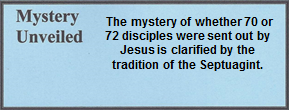03.04.13 283 B.C. Ptolemy Philadelphus, King of Egypt; Greek Translation of Scripture
Ptolemy Philadelphus became the king of Egypt as the result of the demise of the Greek Empire. According to Josephus, his Jewish subjects suggested that he free Jewish slaves since their God placed him in power. He not only approved their request but he also sent gifts to the temple in Jerusalem and gathered Jewish scholars to translate the Hebrew Scriptures into Greek.[1] Tradition says that 72 scholars were gathered on the island of Pharos near Alexandria and there they produced the Greek translation in 72 days, hence the Latin name Septuagint meaning seventy.[2] Many believe this to be a fanciful legend even though some Jewish writings even claim to have the names of the original translators. That translation became known as the Septuagint, and is commonly referred to as “LXX.”[3] This was a major step in preparing the world to receive the gospel of Jesus Christ nearly three centuries later.
Evidently, the Jews enjoyed the comforts of Egypt and favor of the king as a half-century later they built a synagogue for the royal family. Between the years 246 and 221 B.C. in Schedia, Egypt, the synagogue was constructed, and while it has since been destroyed, its dedication inscription was discovered. It is the earliest reference to a synagogue and reads:
For King Ptolemy and Queen Berenike, his sister and wife, and for their children the Jews built the synagogue.
Schedia Synagogue Inscription[4]
Clearly, the Jews of Egypt had become rather wealthy and were on friendly terms with their monarch. This may be reason the king encouraged the translation of the Hebrew Scriptures. The Epistle of Aristeas (285-247 B.C.) claims to be a reliable account of how the translation was made. The royal librarian, Demetrius of Phalerum, suggested to the reigning Egyptian king, Ptolemy Philadelphus that a copy of the Jewish Torah should be placed in the royal library. The king then sent him to Jerusalem with a caravan of gifts to present to the High Priest Eleazar. The Priest sent seventy-two elders, six from each tribe, to a remote island where they could work in peace. Supposedly, it took only seventy-two sessions and, hence, the name “Septuagint” came about. This Epistle might be somewhat fanciful, but it reflects the diligence with which the Jews translated their Torah. The number 72 was rounded off to 70, and symbolized by the Roman numerals LXX. While no one gives the time element of the legend any credibility, the fact that the first translation came from Egypt at this time has been firmly established.
It should be noted that at this point, history clarifies the debate as to whether Jesus sent out 70 or 72 disciples (Lk. 1:1-16 vs. Mt. 11:20-24). In Egypt there were 72 scholars who translated the Hebrew Scriptures but for ease of conversational shorthand, people spoke of “the 70.” In fact, in good Jewish tradition, their names have been preserved as well.[5] Likewise Jesus sent out 72 disciples as recorded in Matthew, but for ease of conversation, Luke said there were 70.

[1]. Josephus, Antiquities 12.2.4-15.
[2]. https://www.ccel.org/bible/brenton/intro.html. Retrieved December 30, 2014.
[3]. See 02.02.25 and a brief discussion by Dr. Petra Heldt at 02.04.01.V.
[4]. Horsley, New Documents Illustrating Early Christianity. 3:121-22.
[5]. B. S. J. Isserlin of the University of Leeds has an article titled The Names of the 72 Translators of the Septuagint based upon the Pseudepigraphic Letter by Aristeas (47-50) to his brother Philocrates written in the 2nd century B.C. It was later repeated by Philo of Alexandria as well as Josephus in Antiquities 12.2.7 (57). The article by Isserlin is available at https://www.jtsa.edu/Documents/pagedocs/JANES/1973%205/Isserlin5.pdf Retrieved June 29, 2015